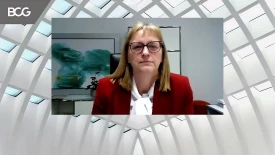Our Regulatory Compliance Services and Approach to Crisis Management
Only a proactive, holistic approach is sufficient in the face of complex regulatory compliance requirements and ongoing scrutiny. BCG has more than a decade of cross-sector experience in the field of compliance and crisis management. Our team takes a tailored approach to everything from substantial compliance transformations to regulatory remediation programs, integrating the organization’s specific business objectives and strategy to meet their areas of need:

- Maturity Assessment. BCG assesses the maturity of the company’s compliance function to identify its strengths and weaknesses, unearthing potential threats and opportunities.
- Crisis Management. BCG supports its clients through every phase of a crisis—even those that are anticipated but have not yet occurred. Our solutions are sustainable, profitable, and help organizations resolve existing crises, mitigate future crisis scenarios, and strengthen overall resilience.
- Transformation/Post-transformation. Our regulatory compliance consulting experts support clients in substantial transformation programs through regulatory remediation. We create remediation plans and then tackle change management processes in collaboration with our clients as the transformation unfolds. We integrate digital capabilities to shore up the first line of defense against both external and internal risks.
How We Enable Compliance, Regulatory Strategy, and Crisis Management Across Industries
Regulatory Compliance in Banking
Financial institutions are highly regulated and monitored by supervisory authorities, leading to many pitfalls in complying with what is typically a complex and international business environment. These institutions have seen an exponential increase in financial crime alerts and know-your-customer (KYC) reviews. BCG’s regulatory compliance consulting experts have helped many leading banks optimize their operating models and mitigate regulatory compliance weaknesses.
Compliance in Energy, Insurance, and Health Care
In sectors such as energy, insurance, and health care, new technologies, increased cybersecurity and digital risks, natural disasters and extreme weather conditions, and political, social, and public health instability have dramatically changed risk profiles. To battle this surge in nonfinancial risk, BCG helps compliance functions in these industries shift from being steady custodians to strategic leaders involved in core business operations and planning.
Our Clients' Success in Compliance and Crisis Management
Make Corporate Regulatory Compliance a Proactive Force
Our experts in AI, predictive modeling, and digital compliance play a key role as we identify solutions to improve risk monitoring. We then work with stakeholders across your organization to deepen a culture of compliance through active participation in the transformation or crisis response. Along the way, we integrate the expertise of BCG’s specialty partners:
- BCG X is our tech build and design division, and an important partner in our work to scale compliance-by-design solutions. BCG X partners with our regulatory compliance consulting teams on advanced behavioral analysis, IT implementations, and cooperative efforts, such as with fintechs that specialize in bank compliance.
- BCG BrightHouse works with companies to uncover and articulate the larger “why” behind an organization’s purpose. From there, we can create a code of conduct that elevates the organization’s integrity and culture of compliance.
Our Insights on Regulatory Compliance and Crisis Management



Meet Our Regulatory Compliance Consulting Leadership Team










